This report covers:
- Before modern springers
- Quackenbush Lightning or model Zero
- First modern spring-piston pellet rifle
- A reader miracle
- Standing on the shoulders of giants
- What came next?
- The dry years
- 1950s
- Rekord
- Velocity race
- Gas spring
- Sig ASP-20
- Written for Yogi
This report will be a quick look at the brief history of the spring-piston airgun. I say brief, even though this type of airgun has been in existence for over 125 years. In its modern form the springer began in 1905/06.
Before modern springers
Before modern springers there were primitive versions of spring-piston airguns, including one that used rubber bands to power the piston. Let’s start there.
Quackenbush Lightning or model Zero
The Quackenbush Lightning or model Zero had a piston that was pulled forward by rubber bands attached to the outside of the gun. A picture is easier to understand than words, so look.
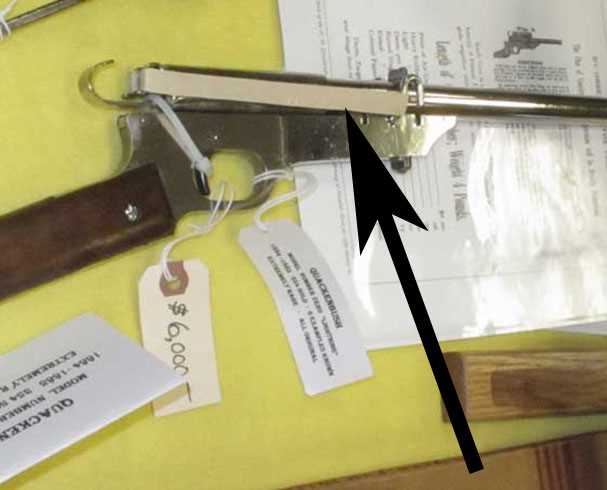
The Lightning piston is pulled forward by rubber bands (arrow) on both sides of the receiver.
Obviously the Lightning was weak, but all springers were before the first modern one. They shot darts the best, and also lead slugs with felt glued onto their end. The projectiles went slow and nobody cared because that was all there was at the time.
First modern spring-piston pellet rifle
In the early 1900s, Lincoln Jeffries developed and built a number of prototype underlever pellet rifles. We would not recognize these rifles today, as some of their features were still in flux, but by 1905 Jeffries had settled on a rotating tap to load his rifle. He patented his underlever cocking mechanism in 1904 and approached several large gun manufacturers to make his rifle in quantity. The Birmingham Small Arms Company that we know as BSA, entered into an agreement with Jeffries in 1905 and their engineers undertook to redesign parts of the Jefferies design to make then easier to produce and use.
In 1905 the first thousand “H The Lincoln” air rifles were delivered to Jeffries and things were underway. I’m now going to fast-forward a bit, because Jeffries apparently didn’t have the distribution channels to sell as many air rifles as BSA could make. So BSA bought the design from him and preceeded to make their own air rifles.
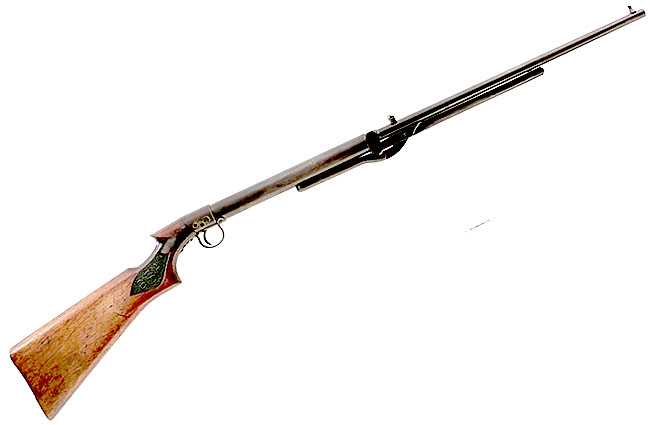
This is a later version of the first BSA underlever.
A reader miracle
And here is where our tale becomes personal. It was at one of the very last Roanoke, Virginia, airgun shows that reader RidgeRunner bought a tired BSA underlever for what was then a good price. The seller told him that it needed work and BB and others assured him that is would be relatively easy to work on so he took it home and worked on it. And to his amazement, it came together and worked as it should. He talks about it all the time. And even Mrs. RidgeRunner is proud of that air rifle and the ambience it lends to their log cabin home.
But the thing about this first modern air rifle was — it worked! It was powerful, compared to what had gone before. It was also accurate. A rifled barrel, when coupled with the newly developed diabolo pellets made the difference.
Standing on the shoulders of giants
Once the modern air rifle was out there other companies started piling on. Like anything else that’s new, they all looked alike until one of them didn’t and then the market went that way.
Some of the Early Dianas looked a lot like the BSA underlevers, but around 1912 they started making breakbarrels, and then the airgun world followed them. Was Diana the first maker to breakbarrels? Heaven’s no! But the early breakbarrel guns were smoothbores that proceeded the BSA underlevers by 25 years. Their hinge mechanisms quickly worked loose and they were notoriously weak and inaccurate. Diana break barrels had tight barrel pivots that lasted.
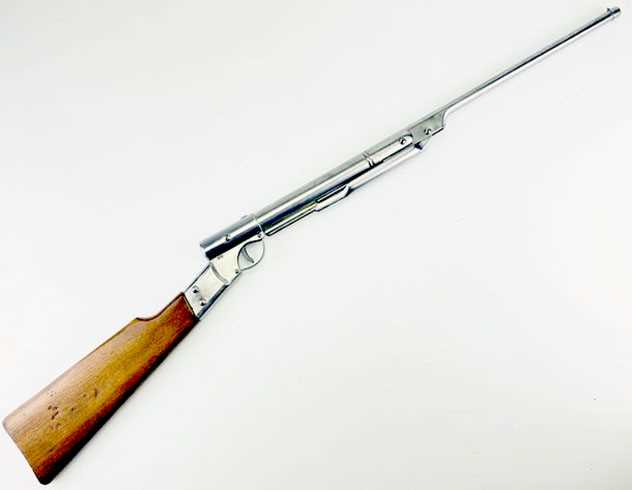
Diana model 20.
What came next?
Well, I’m skipping over a lot of spring guns that are unusual and unique, and I’m doing it for that reason. Just as an example, one unique springer was the Webley Service and Webley Service Mark II. Both were unique in their ability to change barrels and calibers in seconds and their overlever design, but they have more in common with their own air pistols than with other air rifles that pushed the technology.
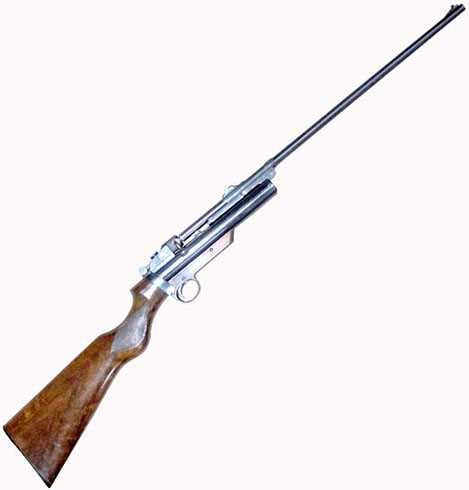
Webley Mark II Service air rifle.
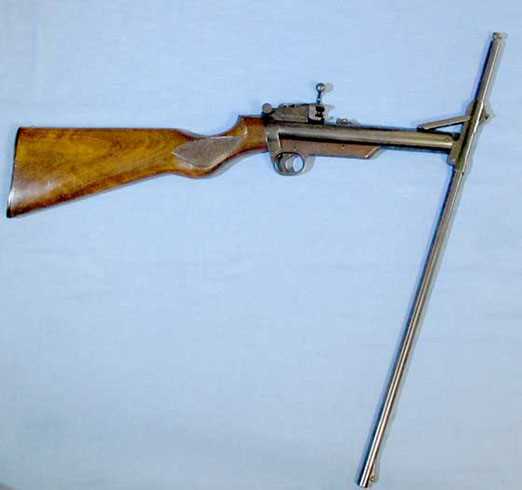
Mark II Service rifle cocked.
The dry years
From about 1930 until sometimes in the mid-1950s the spring-piston world was quiet. They were still being made and there were some unique designs like the Haenel model 28 pellet pistol of the 1930s. But the large technological leaps weren’t there. Of course World War 2 was a chunk of time right in the middle of that period.
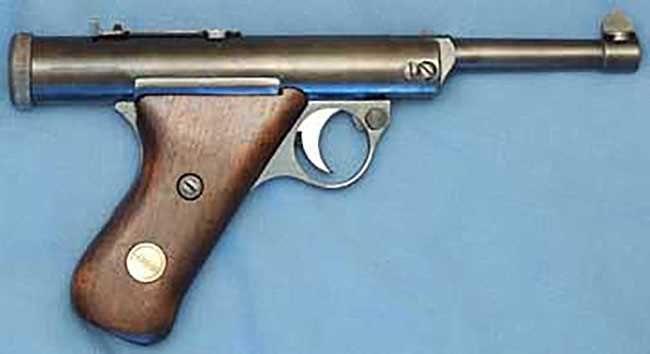
Haenel model 28 air pistol.
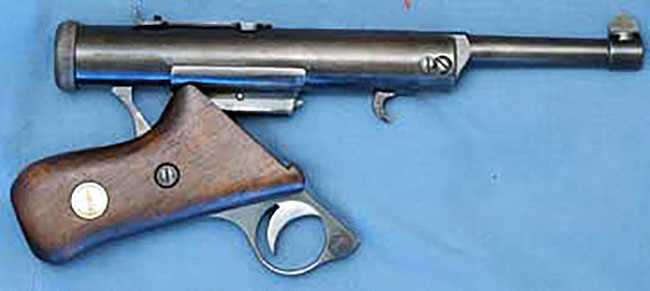
The Haenel 28 borrowed its cocking linkage from smoothbore pellet guns of a half-century earlier.
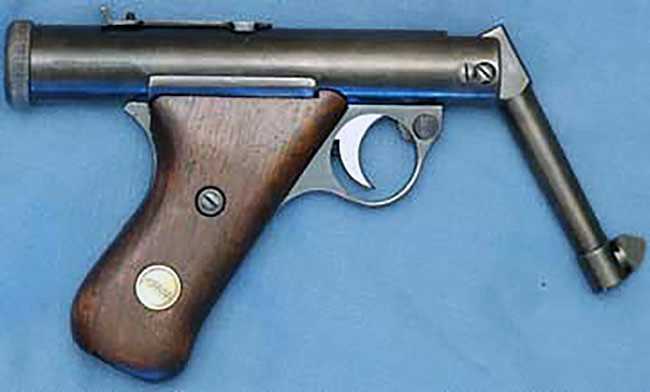
To load the Haenel 28 becomes a break barrel.
1950s
In the 1950s Weihrauch came to the forefront. The HW 55 was among the first of the rifles they made, although the HW 50V dates to the late 1940s, according to the Blue Book of Airguns.
Rekord
The HW 55 originally came with a direct sear engagement trigger, but within a few years the famous Rekord came out and the rest is history. The Rekord is so fine and adjustable that it became the trigger that other triggers wanted to be. Air Arms has a variation of the Rekord in their TX 200 rifles and whenever we talk about spring-piston triggers, it is the Rekord that we compare to.
Velocity race
In the early 1970s BSF, Diana , Weihrauch and Feinwerkbau were all in the great horsepower (which in a pellet rifle is velocity) race. At the time 800 f.p.s. or just a little more for a .177 was as fast as it got Feinwerkbau pulled into the lead until the early 1980s when Weihrauch came out with the Beeman R1 (also known as the HW 80) that was the first spring piston airgun to be designed on a computer. That rifle added close to 200 f.p.s. to the velocity and reigned supreme for a few years until Diana came out with their 48 side lever that bumped the velocity up again.
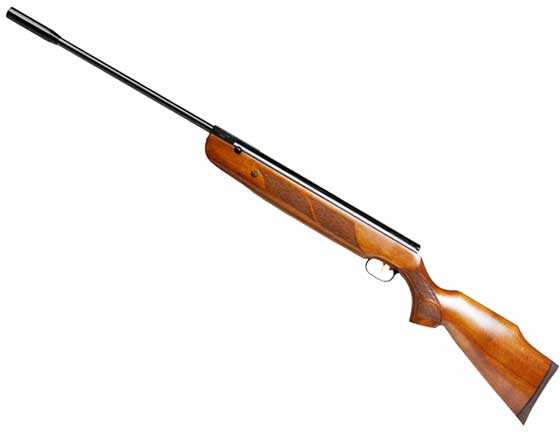
Beeman R1.
Beeman R1
In the late 1990s Gamo topped 1,400 f.p.s. in their .177 break barrels, though they advertised 1,600 f.p.s. That is way too fast, but marketeers knew that velocity sells and they were so happy to mark their boxes with large numbers.
Gas spring
I went past the gas spring that came about in the 1990s. It is also a spring-piston though pressurized gas is substituted for the coiled steel mainspring. They are a little lighter, can remain cocked for a long time without damage, but they are harder to cock and they can have nasty vibrations that sting the face.
Sig ASP-20
All that changed in 2018 when Sig Sauer built an air rifle they called the ASP20. It was easy to cock, powerful, smooth-shooting and had a brand-new trigger design that is entirely different than the Record or its offshoots. It instantly became the high-water mark for spring piston air rifles. And then Sig abandoned it. It was like they had walked into the Golconda diamond mine looking for gold under all the sparkly rocks and left when they didn’t find any.
Written for Yogi
Today’s report was written for reader Yogi who is a spring gun aficionado. When I told him two weeks ago that springers were relatively new in the airgun world he responded defensively. So I thought it was time for all of us to look at the history of spring piston airguns.


B.B.
Actually, if i remember correctly, it was PCP’s that were the new boys on the block. Particularly the the work that Theoben did in the 1980’s. In any case, great report.
Maybe we can get RR to do a guest blog on his “old gal”?
-Y
Yogi,
Daystate invented what we know as the modern PCP in 1980. But PCPs have been around since the mid-1500s, at least.
BB
Good morning,BB.
I think the first written account of a spring powered air rifle was in “The Adventure of the Empty House” by Arthur Conan Doyle. Set in 1894 and published in 1903, Colonel Sebastian Moran uses one to murder one character and attempts to kill Sherlock Holmes. It was “made by Von Herder, the blind German mechanic” and used soft lead pistol bullets. Thus confusing (as usual) the London police.
Roger,
I don’t know that one, but I believe Professor Moriarty tried to kill with an air cane that fired ice bullets. They melted from body heat, leaving no trace what they were.
Or is what I am talking about what you mean, as well?
BB
BB,
No, this was described as using lead pistol bullets. Here is the description from the text:
In his hand he carried what appeared to be a stick, but as he laid it down upon the floor it gave a metallic clang. Then from the pocket of his overcoat he drew a bulky object, and he busied himself in some task which ended with a loud, sharp click, as if a spring or bolt had fallen into its place. Still kneeling upon the floor he bent forward and threw all his weight and strength upon some lever, with the result that there came a long, whirling, grinding noise, ending once more in a powerful click. He straightened himself then, and I saw that what he held in his hand was a sort of gun, with a curiously misshapen butt. He opened it at the breech, put something in, and snapped the breech-block. Then, crouching down, he rested the end of the barrel upon the ledge of the open window,
He obviously hadn’t heard of the artillery hold!
Roger,
Thanks for that! That’s a new one on me.
BB
I was shooting the Webley and the Militia yesterday afternoon. I ran out of time or I would have shot the 1906 “Lincoln Jeffries Model” BSA some also. You see Yogi, I like some of the PCPs, but most of my air rifles and pistols are sproingers. These old gals do not have the power of the new sproingers, but they are mighty fine shooters. I will always try to find room for these old gals at RidgeRunner’s Home For Wayward Airguns.
BB,
Thanks for that short stroll down memory lane. It’s rather unfortunate that airguns were classified as firearms in my country and the only type that we could get our hands on are the CO2 powered airguns. Only recently have spring piston airguns been recognized over here. There were some others that tried before but no local manufacturers took it up for long as that there was no market for it. Now most of my compatriots have shifted to PCPs often converting their CO2 rifles. Fortunately most of those doing conversions are savvy enough that there have been no serious local incidents. Cautionary tale from Taiwan I believe of a CO2 tank being used for a PCP and blowing up was enough for them to approach it with care and safety in mind.
Siraniko
PS: Section First modern spring-piston pellet rifle 1st paragraph 3rd sentence: “He patented his undercover (underlever) cocking mechanism in 1904 and approached several large gun manufacturers to make his rifle in quantity.”
Siraniko,
Yeah, I fixed ALL of those when I edited and WordPress changed that one back. When I went to correct it the software fought with me several times!
Thanks,
BB
Siraniko,
I seem to recall reading, back in the 80s when I first got interested in airguns, that in the Philippines, air shotguns were used to hunt monkeys. Were those guns CO2 powered, am I remembering wrong, or has your country’s laws changed since the early 1980s? I remember them as being pre charged air and I seem to recall the US Navy or Coast Guard altering them to shoot cables from one ship to another via an arrow.
Half
BB-
Excellent survey of the spring piston era. Might I suggest an addendum covering volute springs versus the more familiar wound wire springs.
Errata- Rekord section- you proceed to use Record throughout the paragraph.
Paco,
There is no error there. I just checked it.
BB
B.B.,
But there are inconsistencies, sometimes a “k,” other times a “c.” Also, “that proceeded the BSA underlevers by 25 years” should use “precede” instead of proceed. : ^)
Michael
Michael,
And THAT, ladies and gentlemen, is how you correct BB.
Michael I typed Rekord in every time and WordPress “corrected ” me. It even just corrected the corrections I just made.
Proceed and precede — those were mine. Bad BB! 😉
BB
Mark me as being on the record that a Rekord trigger is quite nice.
B.B.,
It occurred to me that one might proceed to precede something. This stuff can get tricky (and amusing) pretty quickly!
Your “mis-corrected by software” difficulties are maddening aren’t they?
There’s a guitar effect pedal called “Simble.” Try googling that. Not symbol, cymbal or simple, dag nabbit!
Michael
BB
Thanks for the fun stroll through sproinger history while enjoying my predawn coffee. I second Yogi’s motion for Ridgerunner to do a guest report on his famous (at least among us readers) 1906 Lincoln Jeffries Model BSA “ol gal”.
Deck
B.B.,
This is an excellent history of springers. Thank you!
Michael
I really enjoy the history here. Thank you!
This is an excellent topic. As Dennis once said regarding airguns, how do we know where to go if we don’t know where we’ve been.
“It was like they had walked into the Golconda diamond mine looking for gold under all the sparkly rocks and left when they didn’t find any.”
A sad day indeed. I wonder if we will ever get the full story behind that decision.
B.B.
Truly sad about the Sig ASP-20. I thought they just started. I could see a model with open sights, a more powerful and less powerful versions and also maybe a .25 cal down the road. Since Sig doesn’t want it, I wish they’ll sell the patents/design to someone who is willing to produce it with the same quality (Crosman could if they wanted).
Doc
Doc,
Crosman used to be able to. Now I think they would sub it out to China and where would the quality be?
BB
B.B.
Right! My thoughts too. I said Crosman but would like anyone to do it. Would rather it not be China though.
Doc
B.B., MisterAP, Doc Holiday,
I have been trying to dig into what happened to the SIG ASP20 and the WHISKY3 ASP scope.
So far it has been a “armchair Internet” search. I was hoping that some business rag or trade rag or site would cover it; nothing so far.
There are some clues in B.B.s reports covering his visit to SIG and some interesting people not present like Sidney A. Spreadbury, III; SIG’s New Products Manager. The first and I think biggest item is the loss of one of the Lead Engineers: “The third engineer, Justin Daniel Heckert, was not at the dinner with us because, sadly, he passed away very suddenly on February 22 of this year.
He was beloved by everyone at the company”
Second clue: “They did not build the building we were touring. They bought it because it was the largest building available in the area, and, when they moved in, space inside was already tight. They installed their existing machines from the old building, with a plan to install the new machines we were seeing on the tour.”
Then multiple MAJOR military contracts were awarded in rapid succession to SIG.
Third Clue: https://uspto.report/patent/grant/10,288,375
The key item to the ASP20
Fourth Clue: SOME so-called expert… actually “Airgun Influencers”…began a surprisingly vitriolic bashing of the ASP20 creating all manner of circular reporting within our smallish community.
I doubt SIG will ever return to build the ASP20 but when the Patent noted above expires we will see break barrel airguns built much better.
I’m not certain I want to devote more time to digging into a Spilt Milk issue…I would much rather spend that time shooting my two SIG SSP ASP20/WHISKEY 3ASP and smile knowingly that the Godfather of Airguns® was (and is) correct naming it this Millenniums Break Barrel airgun.
shootski
Believe your detective work brings us close to the truth regarding why SIG abandoned the ASP20; someone decided firearms should be the bread-and-butter mainly feeding the company. Maybe a quality non-China manufacturer will improve on the idea, run with it and create something even bigger and better in more calibers.
As for “influencers,” if ole FM were a hiring official for some company, agency, organization, whatever and someone listed “influencer” as part of their work experience on their resume, FM would politely but firmly give them the old cliche “don’t call us – we’ll call you” and end the interview. Quoth the raven: “Nevermore!”
When they came out I called Pyramyd to order one, but the scopes weren’t available yet. By the time I checked back to get one with the scope, they were out of production. What the heck!!!
Motorman
Motorman,
I waited and waited doing more reading and watching on how the ASP20 was doing. I also wanted to wait for the adjustable Cheek Rest.
You probably know I am a very early slave of the DARK SIDE; especially the Big Bore part of PCPs. I really had a strong aversion to all Spring Piston airguns since i am a hunter first and want accuracy first and foremost. I didn’t want to earn another membership in a Secret Society with special handshakes (Artillery Hold) and other magical incantations!
Well at the very end I dropped the coin on a .177 with scope W3 direct from SIG. Then got cought up in a SCAM for a synthetic stocked .22! Got out of that SCAM because I used a Credit Card with great fraud protection from NFCU scaring the scammers with LEO at the door. I thought it was all over for a .22 but then SIG AIR got a number of returned unsold inventory. Long story short: I have my synthetic .22 ASP20/WHISKEY 3 ASP Scope too!
The .22 shoots 10 H&N 21gn hollow point SLUGS out to 75 YARDS into 1 inch from a bench rest. With my TAB GEAR Elite Biathlon Sling
https://youtu.be/k1cUOMIzG3Y
and using the arm loop i get 1 inch first shots at 50 yards offhand; when i haven’t had too much caffeinated coffee! The .177 shoots 1″ groups to 50 yards with heavy pellets rested. There are many PCPs in .177 & .22caliber that can’t do that with bullets (SLUGS.) I haven’t installed the QD cups on the .177 so no idea how well it does offhand.
All the STUFF about the SIG break barrel rifle is BS other than SIG was not going to probably ever sell parts for DIY fixing. But we will never know for certain.
shootski
Aw, Shootski, you’re just trying to make me jealous now with all the talk of owning ASP 20’s in BOTH .177 and .22. Now, if you wanted to do something constructive you’d sell me your .22 ASP 20!
Motorman
St. Louis, MO
B.B.
When you talked about the Quackenbush Lightning, I looked closely at the ID tags in the picture and made out the dates 1884 to 1885. I hadn’t known that anyone named Quackenbush had made airguns that long ago. So I did a Google search and found the following article about a Henry Marcus Quackenbush.
https://www.jimmiedeesairguns.com/rifles/henry-marcus-quackenbush-and-the-quackenbush-model-1-air-rifle-mfd-1876-to-1938/
Is Henry Marcus Quackenbush the one who made the Lightning?
I didn’t see anything in the article about the Lightning, but I was mostly skimming it as I scrolled through the article.
Charles,
Yes. He made airguns from about 1876 until the 1930s.
/blog/2016/08/quackenbush-number-7-bb-gun-part-3/
/blog/2016/08/a-rare-quackenbush-pistol-comes-to-light/
/blog/2010/05/vintage-quackenbush-airguns/
BB
B.B.
I just remembered a Shot Show new product video that I saw that presented a very interesting design for spring piston rifles. The company name is JTS, and they are working on a spring piston rifle that is cocked using a rotary crank handle in the side of the rifle stock.
https://airgundetectives.com/hot-show-2022-part-4-jts-airguns-new-products-for-2022/
cstoehr,
I faintly remember a Sherlock Holmes (Jeremy Brett) series episode with an elaborate air rifle used by an assassin that had a crank cocking system.
Ah found it: http://www.imfdb.org/wiki/Return_of_Sherlock_Holmes,_The#Air_Rifle
Actually looks like a PCP of some sort…
shootski
Shotski,
Interesting, but give this this a look. https://www.youtube.com/watch?v=snPDoXl9ZPs
Kinda cool.
Mike
Since this is a springer topic I wonder if it is not appropriate to ask about the new recoiless gas piston from Spain. Has anyone more information than the few minutes video?
It is not a “sproinger” and maybe most of you know about it already, but it is a bit of interesting airgun history.
https://krites.blogspot.com/2007/04/nazi-killing-air-gun.html
There’s one thing that really puzzles me. Airgun trigger systems went the way of having multiple levers to improve their quality. The triggers of hunting rifles are almost exclusively dry standing, and consist of a year that is in direct contact with the triggers.
Why did airgun and firearms triggers go separate ways?